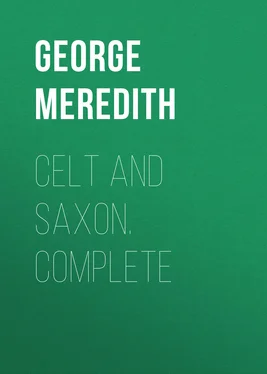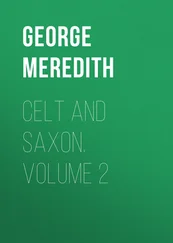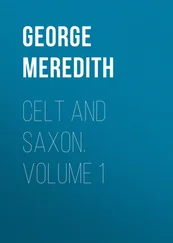George Meredith - Celt and Saxon. Complete
Здесь есть возможность читать онлайн «George Meredith - Celt and Saxon. Complete» — ознакомительный отрывок электронной книги совершенно бесплатно, а после прочтения отрывка купить полную версию. В некоторых случаях можно слушать аудио, скачать через торрент в формате fb2 и присутствует краткое содержание. Жанр: foreign_prose, literature_19, foreign_antique, на английском языке. Описание произведения, (предисловие) а так же отзывы посетителей доступны на портале библиотеки ЛибКат.
- Название:Celt and Saxon. Complete
- Автор:
- Жанр:
- Год:неизвестен
- ISBN:нет данных
- Рейтинг книги:5 / 5. Голосов: 1
-
Избранное:Добавить в избранное
- Отзывы:
-
Ваша оценка:
- 100
- 1
- 2
- 3
- 4
- 5
Celt and Saxon. Complete: краткое содержание, описание и аннотация
Предлагаем к чтению аннотацию, описание, краткое содержание или предисловие (зависит от того, что написал сам автор книги «Celt and Saxon. Complete»). Если вы не нашли необходимую информацию о книге — напишите в комментариях, мы постараемся отыскать её.
Celt and Saxon. Complete — читать онлайн ознакомительный отрывок
Ниже представлен текст книги, разбитый по страницам. Система сохранения места последней прочитанной страницы, позволяет с удобством читать онлайн бесплатно книгу «Celt and Saxon. Complete», без необходимости каждый раз заново искать на чём Вы остановились. Поставьте закладку, и сможете в любой момент перейти на страницу, на которой закончили чтение.
Интервал:
Закладка:
And without a warning, she fled; her features were lost; his power of imagining them wrestled with vapour; the effort contracted his outlook. But if she left him blind of her, she left him with no lessened bigness of heart. He frankly believed in her revelation of a greater world and a livelier earth, a flying earth and a world wealthier than grouped history in heroic marvels: he fell back on the exultation of his having seen her, and on the hope for the speedy coming of midnight, when the fountain of her in the miniature would be seen and drunk of at his full leisure, and his glorious elation of thrice man almost up to mounting spirit would be restored to make him worthy of the vision.
Meanwhile Caroline had withdrawn and the lord of Earlsfont was fretting at his theme. He had decided not to be a party in the sale of either of his daughter’s estates: let her choose other agents: if the iniquity was committed, his hands would be clean of it. Mr. Adister spoke by way of prelude to the sketch of ‘this prince’ whose title was a lurid delusion. Patrick heard of a sexagenarian rake and Danube adventurer, in person a description of falcon-Caliban, containing his shagginess in a frogged hussar-jacket and crimson pantaloons, with hook-nose, fox-eyes, grizzled billow of frowsy moustache, and chin of a beast of prey. This fellow, habitually one of the dogs lining the green tables of the foreign Baths, snapping for gold all day and half the night, to spend their winnings in debauchery and howl threats of suicide, never fulfilled early enough, when they lost, claimed his princedom on the strength of his father’s murder of a reigning prince and sitting in his place for six months, till a merited shot from another pretender sent him to his account. ‘What do you say to such a nest of assassins, and one of them, an outcast and blackleg, asking an English gentleman to acknowledge him as a member of his family! I have,’ said Mr. Adister, ‘direct information that this gibbet-bird is conspiring to dethrone—they call it—the present reigning prince, and the proceeds of my daughter’s estates are, by her desire—if she has not written under compulsion of the scoundrel—intended to speed their blood-mongering. There goes a Welshwoman’s legacy to the sea, with a herd of swine with devils in them!’
Mr. Camminy kept his head bent, his hand on his glass of port. Patrick stared, and the working of his troubled brows gave the unhappy gentleman such lean comfort as he was capable of taking. Patrick in sooth was engaged in the hard attempt at the same time to do two of the most difficult things which can be proposed to the ingenuity of sensational youth: he was trying to excuse a respected senior for conduct that he could not approve, while he did inward battle to reconcile his feelings with the frightful addition to his hoard of knowledge: in other words, he sought strenuously to mix the sketch of the prince with the dregs of the elixir coming from the portrait of Adiante; and now she sank into obscurity behind the blackest of brushes, representing her incredible husband; and now by force of some natural light she broke through the ugly mist and gave her adored the sweet lines and colours of the features he had lost. There was an ebb and flow of the struggle, until, able to say to himself that he saw her clearly as though the portrait was in the palm of his hand, the battle of the imagination ceased and she was fairer for him than if her foot had continued pure of its erratic step: fairer, owing to the eyes he saw with; he had shaken himself free of the exacting senses which consent to the worship of women upon the condition of their possessing all the precious and the miraculous qualities; among others, the gift of an exquisite fragility that cannot break; in short, upon terms flattering to the individual devotee. Without knowing it he had done it and got some of the upholding strength of those noblest of honest men who not merely give souls to women—an extraordinary endowment of them—but also discourse to them with their souls.
Patrick accepted Adiante’s husband: the man was her husband. Hideous (for there was no combating her father’s painting of him), he was almost interesting through his alliance:—an example of how much earth the worshipper can swallow when he is quite sincere. Instead of his going under eclipse, the beauty of his lady eclipsed her monster. He believed in her right to choose according to her pleasure since her lover was denied her. Sitting alone by his fire, he gazed at her for hours and bled for Philip. There was a riddle to be answered in her cutting herself away from Philip; he could not answer it; her face was the vindication and the grief. The usual traverses besetting true lovers were suggested to him, enemies and slanders and intercepted letters. He rejected them in the presence of the beautiful inscrutable. Small marvel that Philip had loved her. ‘Poor fellow’ Patrick cried aloud, and drooped on a fit of tears.
The sleep he had was urgently dream-ridden to goals that eluded him and broadened to fresh races and chases waving something to be won which never was won, albeit untiringly pursued amid a series of adventures, tragic episodes; wild enthusiasm. The whole of it was featureless, a shifting agitation; yet he must have been endowed to extricate a particular meaning applied to himself out of the mass of tumbled events, and closely in relation to realities, for he quitted his bed passionately regretting that he had not gone through a course of drill and study of the military art. He remembered Mr. Adister’s having said that military training was good for all gentlemen.
‘I could join the French Foreign Legion,’ he thought.
Adiante was as beautiful by day as by night. He looked. The riddle of her was more burdensome in the daylight.
He sighed, and on another surging of his admiration launched the resolve that he would serve her blindly, without one question. How, when, where, and the means and the aim, he did not think of. There was she, and here was he, and heaven and a great heart would show the way.
Adiante at eighteen, the full length of her, fresh in her love of Philip, was not the same person to him, she had not the same secret; she was beautiful differently. By right he should have loved the portrait best: but he had not seen it first; he had already lived through a life of emotions with the miniature, and could besides clasp the frame; and moreover he fondled an absurd notion that the miniature would be entrusted to him for a time, and was almost a possession. The pain of the thought of relinquishing it was the origin of this foolishness. And again, if it be fair to prove him so deeply, true to his brother though he was (admiration of a woman does thus influence the tides of our blood to render the noblest of us guilty of some unconscious wavering of our loyalty), Patrick dedicated the full-length of Adiante to Philip, and reserved the other, her face and neck, for himself.
Obediently to Mr. Adister’s order, the portrait had been taken from one of his private rooms and placed in the armoury, the veil covering the canvas of late removed. Guns and spears and swords overhead and about, the youthful figure of Adiante was ominously encompassed. Caroline stood with Patrick before the portrait of her cousin; she expected him to show a sign of appreciation. He asked her to tell him the Church whose forms of faith the princess had embraced. She answered that it was the Greek Church. ‘The Greek,’ said he, gazing harder at the portrait. Presently she said: ‘It was a perfect likeness.’ She named the famous artist who had painted it. Patrick’s ‘Ah’ was unsatisfactory.
‘We,’ said she, ‘think it a living image of her as she was then.’
He would not be instigated to speak.
‘You do not admire it, Mr. O’Donnell?’ she cried.
Читать дальшеИнтервал:
Закладка:
Похожие книги на «Celt and Saxon. Complete»
Представляем Вашему вниманию похожие книги на «Celt and Saxon. Complete» списком для выбора. Мы отобрали схожую по названию и смыслу литературу в надежде предоставить читателям больше вариантов отыскать новые, интересные, ещё непрочитанные произведения.
Обсуждение, отзывы о книге «Celt and Saxon. Complete» и просто собственные мнения читателей. Оставьте ваши комментарии, напишите, что Вы думаете о произведении, его смысле или главных героях. Укажите что конкретно понравилось, а что нет, и почему Вы так считаете.












